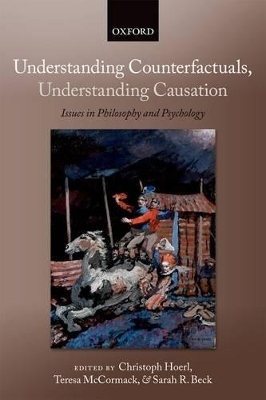
Understanding Counterfactuals, Understanding Causation
Oxford University Press (Verlag)
978-0-19-959069-8 (ISBN)
How are causal judgements such as 'The ice on the road caused the traffic accident' connected with counterfactual judgements such as 'If there had not been any ice on the road, the traffic accident would not have happened'? This volume throws new light on this question by uniting, for the first time, psychological and philosophical approaches to causation and counterfactuals. Traditionally, philosophers have primarily been interested in connections between causal and counterfactual claims on the level of meaning or truth-conditions. More recently, however, they have also increasingly turned their attention to psychological connections between causal and counterfactual understanding or reasoning. At the same time, there has been a surge in interest in empirical work on causal and counterfactual cognition amongst developmental, cognitive, and social psychologists--much of it inspired by work in philosophy. In this volume, twelve original contributions from leading philosophers and psychologists explore in detail what bearing empirical findings might have on philosophical concerns about counterfactuals and causation, and how, in turn, work in philosophy might help clarify the issues at stake in empirical work on the cognitive underpinnings of, and relationships between, causal and counterfactual thought.
Christoph Hoerl is Associate Professor (Reader) in Philosophy at the University of Warwick. Between 2004 and 2008, he was co-director (with Teresa McCormack and Johannes Roessler) of the interdisciplinary AHRC Research Project 'Causal Understanding: Empirical and Theoretical Foundations for a New Approach'. With Teresa McCormack and Stephen Butterfill, he is co-editor of Tool Use and Causal Understanding (OUP, forthcoming). Teresa McCormack is Professor of Developmental Psychology at the School of Psychology, Queen's University Belfast. She was co-director of the AHRC-funded project on Causal Understanding based at the University of Warwick. Her research primarily addresses issues concerning children's temporal and causal cognition. She has published two co-edited interdisciplinary books: Time and Memory: Perspectives in Philosophy and Psychology (OUP, 2001), with C. Hoerl, and Joint Attention and Communication (OUP, 2005), with N. Eilan, C. Hoerl, and J. Roessler. A further volume entitled Tool Use and Causal Cognition, co-edited with C. Hoerl and S. Butterfill is forthcoming with OUP. Sarah Beck studied Psychology and Philosophy at the University of Oxford and gained her PhD in developmental psychology from the University of Birmingham, where she is currently a Senior Lecturer. Her research is concerned with children's and adults' thinking about time and knowledge, with particular interest in the cognitive processes involved in the development of counterfactual thinking.
1. Introduction: Understanding Counterfactuals and Causation ; 2. Psychological Studies of Causal and Counterfactual Reasoning ; 3. The Relationship between Children's Causal and Counterfactual Judgments ; 4. Perceptual Causality, Counterfactuals, and Special Causal Concepts ; 5. Counterfactual and Other Forms of Conditional Reasoning: Children Lost in the Nearest Possible World ; 6. Multiple Developments in Counterfactual Thinking ; 7. Domain-Specific Causal Knowledge and Children's Reasoning about Possibility ; 8. Mental Simulation and the Nexus of Causal and Counterfactual Explanation ; 9. Counterfactual Availability and Causal Judgement ; 10. The Role of Counterfactual Dependence in Causal Judgements ; 11. Counterfactual and Causal Thoughts about Exceptional Events ; 12. Causation First: Why Causation is Prior to Counterfactuals ; 13. Suppositions, Conditionals, and Causal Claims
| Reihe/Serie | Consciousness & Self-Consciousness Series |
|---|---|
| Verlagsort | Oxford |
| Sprache | englisch |
| Maße | 164 x 242 mm |
| Gewicht | 578 g |
| Themenwelt | Geisteswissenschaften ► Philosophie ► Erkenntnistheorie / Wissenschaftstheorie |
| Geisteswissenschaften ► Philosophie ► Metaphysik / Ontologie | |
| Geisteswissenschaften ► Psychologie ► Allgemeine Psychologie | |
| Geisteswissenschaften ► Psychologie ► Verhaltenstherapie | |
| ISBN-10 | 0-19-959069-9 / 0199590699 |
| ISBN-13 | 978-0-19-959069-8 / 9780199590698 |
| Zustand | Neuware |
| Informationen gemäß Produktsicherheitsverordnung (GPSR) | |
| Haben Sie eine Frage zum Produkt? |
aus dem Bereich

![Was heißt Denken?. Vorlesung Wintersemester 1951/52. [Was bedeutet das alles?] - Martin Heidegger](/media/113619842)
